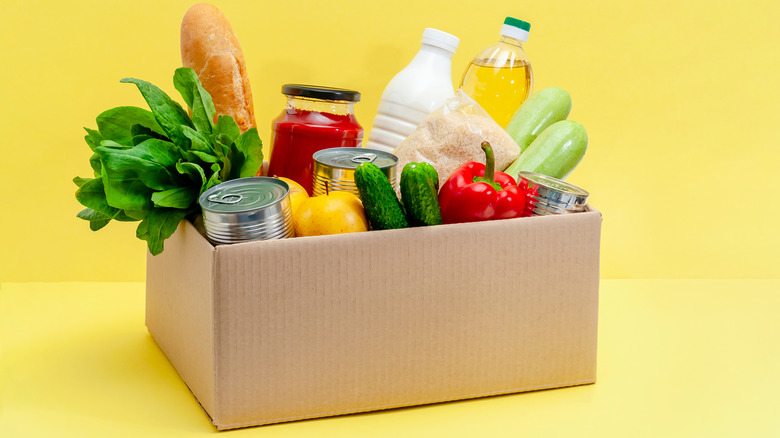Study Shows College Food Pantries Help Improve Students' Mental Health
Instant ramen is famously the lifeblood of struggling academics. It might be a joke amongst college students — but it's really no laughing matter.
The USDA defines food security as "access by all people at all times to enough food for an active, healthy life," and on a steady diet of cost-effective, pre-packaged foods, many college students aren't meeting the definition. Niyati Parekh, professor of public health nutrition at the NYU School of Global Public Health, explains that food security isn't just about eating enough calories in a day; it's also about the nutritional quality of the food people can access. "It is calorie-dense, nutrient-poor foods that are typically cheap and affordable," Parekh says. "So, while food insecurity can lead to hunger, over time it can also lead to obesity and other related metabolic dysregulation."
According to U.S. News, the average cost of a meal plan for one academic year at a U.S. college runs between $3,300-$5,000, reaching up to as much as $9,000 at some institutions. Considering 56% of college students work while taking classes to afford tuition, per Fortune, and the federal average minimum wage still remains at only $7.25 per hour in 2022, a student making minimum wage would need to work nearly 700 hours to pay for an average university meal plan — and that doesn't even take tuition into account. Luckily, a recent study by the University of California offers a hopeful and realistic solution for curbing food insecurity on college campuses.
Campus food pantries table student food insecurity
According to the University of California, college food pantries could substantially improve students' mental health. Led by Suzanna M. Martinez MS, PhD of UC San Francisco's Department of Epidemiology and Biostatistics, the team conducted an online survey of 1,855 UC students who regularly utilized the campus food pantry. Students who visited the food pantry more frequently per month reported not just improved physical health, but improved mental wellbeing (including better-perceived health and fewer symptoms of depression) and sufficient sleep. Although the data was gathered in 2019, the study remained unreleased to the public until this week, published in the Journal of Nutrition Education and Behavior ( via ScienceDirect).
Folks experiencing food insecurity are at a marginally higher risk of mental health issues, according to the Utah Food Bank, as well as cognitive dysfunction. A study by Di Fang et al of the Department of Agricultural Economics and Agribusiness at the University of Arkansas concluded that food insecurity is directly related to a 257% increased risk of anxiety and 253% increased risk of depression (via BMC Public Health). These can be particularly harmful to college students, who are already more at-risk for these mental conditions, per the Mayo Clinic.
The future of campus dining options
Not only does food insecurity dramatically impact the way a person operates during their daily life, it can also have a detrimental effect on academic performance. A study led by Maureen McCoy, MS, RD, of Arizona State University found that people between the ages of 18-24 (in other words, college-aged) were more likely to be unemployed during the Coronavirus pandemic, via Health Affairs. Also, as campuses nationwide shut down at the onset of COVID-19, students at risk of food insecurity were suddenly cut off from dining options they relied on — and had already paid for. Feeding America found that over 50 million people living in the U.S. are considered food-insecure, a massive and sudden increase from the estimated 35 million people experiencing food insecurity before the COVID-19 pandemic began.
In combination with the impacts of food insecurity during a normal year, these factors were directly correlated with lower GPAs and lower class attendance rates, per McCoy's study. As the U.S. moves forward into rebuilding its social and economic infrastructure in a post-pandemic world, campus food pantries like the one at the University of California emerge as the perhaps-unlikely star of the food-insecurity conversation — or else, perhaps they should.


